MercoPress. South Atlantic News Agency
Tag: Falkland War
-
Tuesday, December 9th 2025 - 23:43 UTC
Falklands War iconic Yomper statue recovered with donations
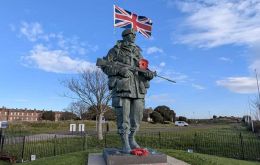
The campaign to preserve the Yomper statue, a tribute to the British forces that yomped across East Falkland, during the Falkland Islands war in 1982, has raised more than £16.000, exceeding its £9,000 target.
-
Wednesday, October 8th 2025 - 21:44 UTC
Falkland Islands hero's medals sell for £65,000 as widow honors his final wish
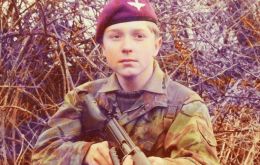
A Falklands War hero's medals have sold for £65,000 at auction, fulfilling his final wish that the proceeds would give his widow financial security. The Military Medal group belonging to Corporal Barry “Baz” Grayling of 2nd Battalion, from the Parachute Regiment went under the hammer at Noonans Mayfair in London.
-
Monday, August 25th 2025 - 23:00 UTC
Victor tanker Day, crucial in Falklands’ war, next 28th at the Yorkshire Air Museum

The Yorkshire museum, based at Elvington near York, has repainted its Victor K2 tanker plane in camouflage colors – the first time it’s had this design since the 1980s. Victor XL2312, which has been at the museum since 1993, was previously showcased in a hemp color scheme.
-
Wednesday, August 20th 2025 - 08:10 UTC
Trump in the Falklands

By Barry Eichengreen (*) - US President Donald Trump’s trade war resembles nothing so much as UK Prime Minister Margaret Thatcher’s Falklands War in 1982: one side deploys massive force, and the other withdraws with its tail between its legs.
-
Saturday, June 14th 2025 - 08:13 UTC
Final farewell for an Iconic Falklands War destroyer HMS Bristol
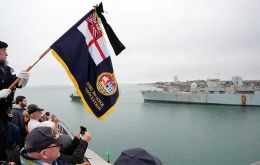
A Royal Navy destroyer that participated in the Falklands War left Portsmouth Harbor on Friday, June 13th, and is travelling to Turkey, where she will be recycled. A small group of spectators came to see HMS Bristol, the only Type 82 ever built of her class, being towed out of Portsmouth Harbor to start her journey to an EU-approved recycling yard in Turkey.
-
Monday, May 19th 2025 - 08:53 UTC
Falklands war MV Atlantic Conveyor at Cunard’s War Memorial in Liverpool
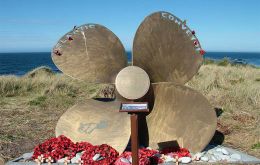
The Liverpool-registered MV Atlantic Conveyor, 43 years ago, during the Falklands War was hit by two Exocet missiles, and Cunard’s War Memorial in front of the Cunard Building will be updated with the addition of the numerals “1982” to commemorate the loss.
-
Monday, May 12th 2025 - 23:39 UTC
Falklands, 40th anniversary of Mount Pleasant Complex and its air, sea and land military facilities
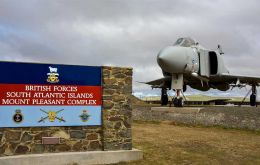
Mount Pleasant Complex is marking its 40th year as an Royal Air Force fighter and transport presence in the Falkland Islands. Some fitty three kilometers southwest of the capital, Stanley, MPC was officially opened on 12 May 1985 by Prince Andrew, and became fully operational the following year, May 1986, making it the newest permanent air base for the RAF.
-
Thursday, March 27th 2025 - 08:12 UTC
Falklands, maintenance work on a historic bridge

The Falklands Public Works Department Highways Section would like to advise the public that maintenance to the Malo Bridge is scheduled to take place on Wednesday 26th March 2025.
-
Thursday, December 5th 2024 - 10:40 UTC
Falklands, 140 next of kin visit the Argentine Military Cemetery at Darwin
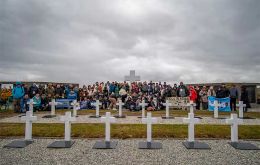
A hundred and forty next of kin of Argentine combatants fallen during the 1982 South Atlantic conflict this Wednesday arrived at the Falkland Islands to visit the Argentine military cemetery at Darwin to honor the graves of their loved ones.
-
Friday, November 8th 2024 - 10:55 UTC
“Falklands are British”, an unequivocal message from UK Minister for the Armed Forces

Plymouth has a long and rich naval history. It is celebrated as where Sir Francis Drake played bowls as the Spanish Armada loomed in 1588 and as a key embarkation point for invading Allied forces on D-Day. However, the city’s critical role in the Falklands War is perhaps less widely appreciated.
